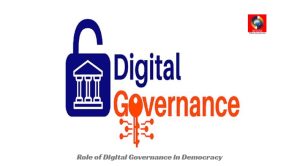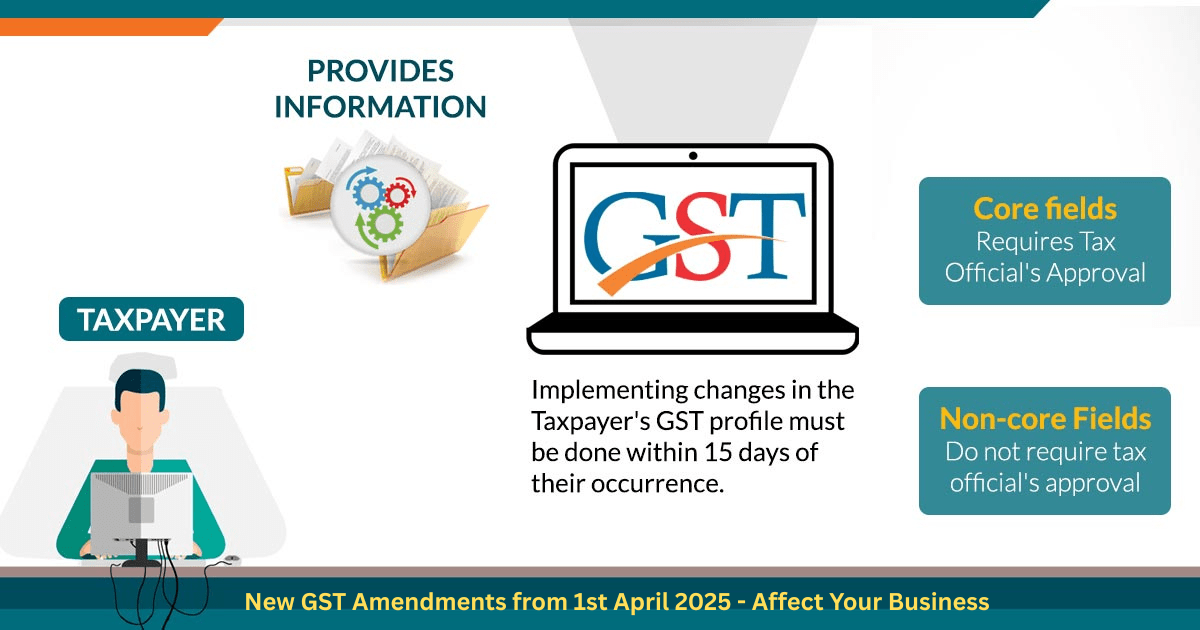Introduction
The speed of technological progress has transformed 21st-century government and ushered in digital government—a process by which governments use digital platforms to become citizen-centric, transparent, and efficient. Digital government has been crucial in bridging the gap between governments and citizens in democracies, expanding access to public services, and improving accountability.
What is Digital Governance?
E-governance refers to the use of electronic technologies—i.e., artificial intelligence (AI), big data, blockchain, and cloud computing—by the government to facilitate improved public administration, citizen engagement, and decision-making based on more information. It involves e governance initiatives, delivery of public services through the Internet, electronic voting, and open data policy.

How Digital Governance Strengthens Democracy?
- Greater Transparency and Accountability: Government accountability is one of the pillars of democracy. More transparency is offered by e-government since information regarding the government, policies, and financial transactions are made available in real-time to citizens. Open Data Initiatives
Blockchain Technology: Blockchain is being used by governments to create tamper-evident public spending and election records that reduce the potential for corruption to take place. Electronic Public Feedback Mechanisms: Grievance websites and feedback mechanisms enable citizens to complain against inefficiency and hold the public representatives accountable. For example, India’s Digital India initiative promotes transparency through enabling government documents to be uploaded online, circumventing bureaucratic corruption.
- Enhanced Citizen Involvement in Decision-Making: Democracy works best when its people are actively engaged in governing their country. Cyber-governance opens new means of active participation in policy-making and political debate.
- E-Consultations & Online Referendums: Governments can decide at the people’s behest by taking the people’s opinion on policies and legislation through the internet.
- Social Media and Web Campaigning: Political leaders and citizens interact directly on platforms like Twitter, Facebook, and Instagram to facilitate political debates in real-time.
- E-Petitions: Online petitions allow citizens to demand policy change in an instant. Both the USA and the UK have government websites for online petitions, where several signatures can get topics put into parliament.
- Improved Public Service Delivery: It is the capability of a government to deliver fundamental services that provides people with
confidence in democracy. E-government brings government services to people and facilitates public administration.
- E-Government Portals: Citizens can have the option to apply for documents (permits, passport, etc.), pay taxes, and avail social benefits without administrative delay from the government.
- AI Chatbots: Chatbots are utilized by most governments to respond in real-time to citizen’s queries and cut reliance on physical offices.
- Smart Cities & IoT: Digital governance has also given rise to smart cities, with AI and sensor data enabling better traffic, waste management, and law enforcement. For example, Estonia’s e-Governance enables people to carry out 99% of government business online, and it is one of the most technologically advanced democracies in the world.
Strengthening Electoral Processes:
- Voting is the foundation of democracy, and e-governance is transforming the face of how it is done.
- E-Voting: Most countries are experimenting with electronic voting machines to hold elections more conveniently, speedily, and safely.
- Voter Registration & Online Identity: Online IDs prevent voter fraud as they only allow eligible citizens to vote.
- Election Monitoring: AI and blockchain help detect electoral fraud, while social media helps provide real-time election updates. For instance, Brazil’s electronic voting system has enhanced the voters’ accessibility and lowered instances of election fraud.
Challenges and Risks to Democracies by Cyber governance
While there are numerous virtues of electronic governance, it is also a source of great concern that can erode democratic values if dealt with carelessly.
- Digital Divide and Inequality: All of the citizens are not equally benefited from digital resources, and hence the digitally literate and digitally excluded gap.
- Rural-Urban Divide: Rural areas of most developing countries lack stable internet, thereby excluding citizens from e-governance services.
- Older Citizens and Low-Income Groups: These are the individuals who are not familiar with technology and hence cannot be made a part of digital democracy. For instance, in India, the pace of online governance and digital payments has eluded rural citizens because of poor internet penetration and digital literacy.
- Political Manipulation and Misinformation: Social media as an instrument of the state has also produced political propaganda, disinformation, and misinformation.
- Deepfakes & AI Content: Political opponents may use AI-generated videos to spread disinformation, misleading voters.
- Toll Farms & Bots: Political parties and governments employ bots in a bid to sway the minds of individuals and control the outcome
of elections. - Algorithmic Bias: Social media platforms reward sensationalized or biased information, which, in turn, feeds political polarizations. For instance, Russia’s interference in the US elections in 2016 via social media manipulation was something that was seen as an issue
regarding the vulnerabilities of digital democracy.
- Cybersecurity Threats & Privacy Issues:As governments venture into digitalization of government services, they are increasingly
being targeted by cyberattacks, data breaches, and surveillance abuse.- Hacking & Election Interference: Foreign hackers and cyber-thieves can hack into voting machines or manipulate government databases.
- Mass Surveillance: Governments abuse online regulation to spy on citizens, undermining personal freedoms.
- Privacy intrusions of data: The majority of government sites gather vast quantities of personal data with minimal privacy safeguards. For instance, China’s Social Credit System monitors individuals & behavior, conjuring visions of digital authoritarianism masquerading as government.
The Future of Digital Government and Democracy
To help democratic nations access the best and reduce the risk from e-governance, they must implement strong policies and ethical practices.
- Enhancing Digital Infrastructure Governments need to invest in digital literacy, expand access to the internet, and bridge the digital divide so that e-governance is inclusive.
- Social Media & Misinformation Regulation More stringent laws against cyber fake news, data manipulation, and political propaganda must be put in place to guarantee electoral integrity.
- Enhancing Cybersecurity & Privacy ControlsGovernments should implement robust cybersecurity measures, encryption rules for data, and
collection of information from citizens voluntarily in order to protect democratic principles. - Encouraging Ethical AI & Algorithmic TransparencyArtificial Intelligence in government must be nonpolitical, and AI algorithms must be explainable and transparent.
- Cooperation in Cyber GovernanceCountries must collaborate to establish global standards on election security, cyber
anonymity, and cybersecurity in the digital age.
Conclusion
Digital governance can remake democracy more open, efficient, and participatory. Digital governance can also destroy privacy, political stability, and social equality if not appropriately regulated and used ethically. Democracies should therefore weigh technological progress against the safeguarding of democratic values in a manner that digital governance will enable citizens and not dominate them. With more and more new
digital technologies emerging, governments, policymakers, and citizens should unite to create a democratic digital future based on the values of freedom, fairness, and inclusion. Institutions like Biyani Girls College are committed to nurturing responsible digital citizens by combining academic excellence with ethical values, preparing students to lead in a tech-driven democratic world.”
Blog By:-
MS. Sarika GUPTA
Assistant Professor, Dept of Political Science
Biyani Girls College




